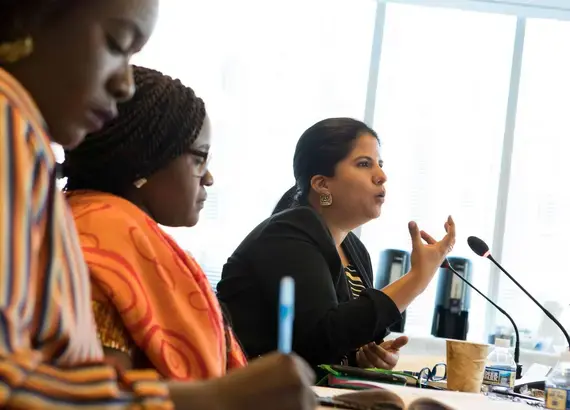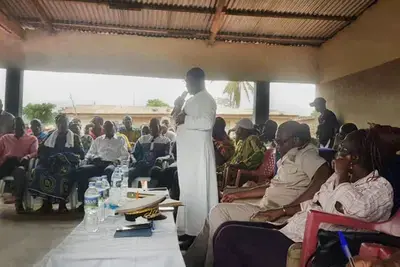
Politically-active women gather at NDI’s Washington, D.C., headquarters in May 2018 to discuss their experiences with Violence Against Women in Political Parties and what can be done to solve it.
Success Story
NDI Initiative Reinvigorates Efforts to Tackle the Discouraging Impact of Violence Against Women in Political Parties
NDI has taken a leading role in documenting and tackling the issue of Violence Against Women in Political Parties (VAW-PP). Over the past two years, through its No Party to Violence initiative, NDI conducted research with 25 political parties across Côte d’Ivoire, Honduras, Tanzania, and Tunisia. Speaking with women and men political party members and leaders, NDI’s study offers the first systematic data of the current understandings and perceptions of men and women party members around the types, levels, and impact of violence against women within these institutions.
According to NDI research, women party members are more likely than men to be victims of violence, to witness violence against others in their own party, and to perceive a climate of violence within the party itself. More than half of women surveyed (54.7 percent) report having experienced at least one form of violence while carrying out their political party functions, with the largest share suffering from psychological violence (48.4 percent). This violence has a discouraging impact on women’s political leadership ambitions, often leading to their departure from politics, robbing parties and politics of a key resource.
I experienced physical violence from my former political party. It was an awful experience. But, for me, the most important thing is why it happened. Physical violence would not happen if it were not condoned by leaders.
-Female party member, Tunisia
Three party leaders asked me for sex for them to help me win the nomination contest. I refused and I lost.
-Female party member, Tanzania
With regard to young women who are educated, they are especially likely to experience violence and, unfortunately, many of them left political parties. There are a lot of extraordinary women I know. They decided to leave.
-Female party member, Tunisia
While the global average of women in national parliaments has nearly doubled in the last two decades, increased numbers of nationally-elected women do not reflect significant advancements in women’s leadership and power in political parties. As a key gateway to policy creation and political office, parties can foster women’s ability to enter and participate equally in political life. However, because of their historically elite male power structures and women’s lower status within parties, political parties are often bastions for inequality, allowing and enabling violence against women within their membership to take place.
At its core, violence against politically-active women impacts women’s status and their ability, confidence, and desire to participate in parties and politics. NDI launched the No Party To Violence assessment to counter this narrative and is using it to revitalize the Win With Women political party assessment, which has been utilized by more than 100 political parties across the world since it was launched by former Secretary of State Madeleine K. Albright in 2003.
Introduced at Liberal International’s 62nd Congress in Dakar, Senegal, in November 2018, the updated Win With Women Assessment is informed by Reflect, Reform, Re-engage: A Blueprint for 21st Century Parties – the Institute’s 2017 review of political party strengthening. The assessment consists of a step-by-step guide to help party members and practitioners gauge the individual, institutional, and socio-cultural barriers that exist to prevent the full achievement of gender equality, and providing a platform for internal dialogue between women and men members of a political parties on how they can reform their parties to ensure meaningful women’s participation.
“The party has not proposed or taken measures in response to cases of violence against politically-active women. This does not provide security, it contributes to impunity.”
- Female party member, Honduras
The assessment culminates in two updated Global Action Plans (GAPs), which build off of the Institute’s 15 years of experience administering the original assessment across the globe, as well as updated thinking on the barriers created by violence against women in politics. The GAPs give political parties a blueprint for actionable changes that parties can take to address the barriers that politically-active women face on the individual, institutional, and socio-cultural level. The GAPs allow political parties to work amongst themselves and on the national level to end violence against politically-active women, encourage positive change toward gender equality, and create an enabling environment for women’s political participation.
Tangible change within political parties needs to be made in order to create opportunities for women’s involvement in political life, instead of creating more barriers to political engagement. For as long as women are blocked or prevented from participating in political parties, the globe will not see truly inclusive and representative democracy.



